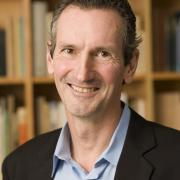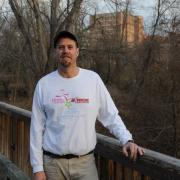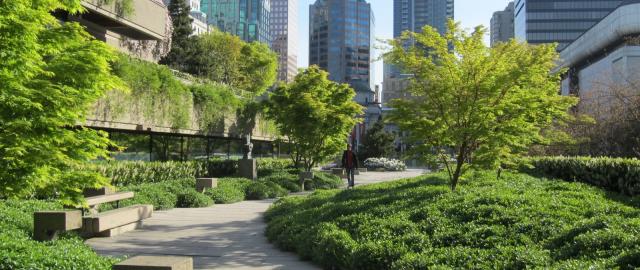Urban Dialogue of Critical Environmental Issues
A Discussion of Infrastructure, Metabolism, and Human Dimensions of Cities
Speaker Information
Gaboury Benoit is the Grinstein Professor of Environmental Chemistry at Yale’s School of Forestry and Environmental Studies, where he has served as the Associate Dean for Research and Director of Doctoral Studies. He has a joint appointment in Yale’s Environmental Engineering program. He founded Yale’s Center for Coastal and Watershed Systems in 1992 and acted as its faculty director. He is also faculty director of Yale’s Hixon Center for Urban Ecology.
Dr. Benoit received his bachelor’s degree from Yale’s Department of Geology and Geophysics where he studied environmental chemistry. After working for three years in an independent environmental consulting firm, he earned a master’s in Water Resources Engineering from MIT (1985) and a PhD in environmental chemistry from the M.I.T.-Woods Hole joint program (1988).
Gabe is a nationally recognized expert on environmental chemistry and the impacts of land development on water. Recent research includes urban environmental issues and watershed based studies of nonpoint source pollution. Among his many publications, he co-authored the book New Strategies for America's Watersheds: Integrating Ecological, Economic, and Social Factors that was published by National Academy Press in 1998. Another important recent publication is the book Land and Natural Development (L.A.N.D.) Code, co-authored with Diana Balmori of Yale’s Architecture School, and which is a set of guidelines for sustainable land development.

Abstract
Urban Residential Landowners: The Social Dilemma of the New and Dominant Forest Landowner
Speaker Information
Morgan Grove is a social scientist and Team Leader for the USDA Forest Service’s Baltimore Urban Field Station and is a lecturer at Yale University. He joined the USDA Forest Service in 1996 and has been a Co-Principal Investigator in the Baltimore Ecosystem Study (BES) since its beginning in 1997. Morgan has a B.A. from Yale College with a dual degree in Architecture and Environmental Studies, a M.F.S. in Community Forestry from Yale University and a Ph.D. in Social Ecology from Yale University.

Abstract
Environmental Justice of Green Infrastructure: AN Urban Sustainability Imperative
Speaker Information
Dr. Christopher Boone is Professor and Associate Dean in the School of Sustainability at Arizona State University. He is presently a visiting professor at Georgetown University.
For more than a dozen years, he has participated in the Baltimore Ecosystem Study examining the long term social and environmental drivers and consequences of urbanization. His research contributes to ongoing debates in sustainable urbanization, environmental justice, vulnerability, and global environmental change. He is a co-PI for the Central Arizona Phoenix LTER,
Baltimore Ecosystem LTER, two Urban Long Term Research Area projects (DC, Los Angeles) and the PI for a comparative ULTRA award (Phoenix, Albuquerque, Las Cruces) all supported by the National Science Foundation. For the past three years he has sat on the scientific steering committee for the Urbanization and Global Environmental Change project, a core initiative of the International Human Dimensions program, and also participated in the US Global Change Research Program's US National Climate Assessment for Cities. He received his PhD in Geography from the University of Toronto in 1994.

Abstract
Growth, Urban Populations-at-Risk, and Climate-Change Hazards
Speaker Information
Dr. Deborah Balk is Professor at the City University of New York (CUNY)’s Baruch School of Public Affairs and the CUNY Graduate Center (in the Sociology and Economics Programs) and Associate Director of the CUNY Institute for Demographic Research. Her expertise lies in spatial demography and the integration of earth and social science data and methods to address interdisciplinary policy questions. Her current research focus is on urbanization, population, poverty, and environmental interactions (such as climate change). Prior to joining CUNY in 2006, she was a research scientist at Columbia University’s Center for International Earth Science Information Network where she was also lead Project Scientist for the NASA-funded Socioeconomic Data and Applications Center. She received her PhD in Demography from the University of California at Berkeley, and her Master’s Degree in Public Policy, and A.B. in International Relations, from the University of Michigan, Ann Arbor. She has recently completed service on a National Research Council panel on Himalayan Glaciers, Hydrology, Climate Change, and Implications for Water Security and co-authored a paper on city population forecasts and water scarcity in the Proceedings of the National Academy of Sciences.

Abstract
Imagining Urban Futures: Some Reflections
Speaker Information
Dr. Paty Romero-Lankao is a "multidisciplinary sociologist" by training leading the Urban Futures Initiative at NCAR, US where she is a research scientist since 2006. Her work has focused on crucial intersections between urban development and the environment. In particular, she has studied key issues of (a) how particular cities attempt to meet the challenges of reducing emissions while improving their capacity to respond to environmental impacts; (b) how urban development impacts the environment; and (c) what societal factors
explain cities' vulnerability/resilience to environmental hazards. In addition to research supported by academic awards, she has participated in global and local endeavors promoted by IPCC, UNDP and UN-HABITAT. She was co-leading author to Working Group II of the Nobel prize- winning IPCC’s Fourth Assessment Report and is currently convening author of the AR5 North American chapter.

Speaker Information
Dr. Ming (Frances) Kuo is a faculty member at the University of Illinois at Urbana-Champaign, where she directs the multidisciplinary Landscape and Human Health Laboratory. Her background is in cognitive psychology and environmental psychology, with degrees from the University of California, Berkeley (M.A.) and the University of Michigan (Ph.D.). Dr. Kuo is a nationally and internationally recognized scientist examining the impacts of the urban forest on human health. Her research focuses on how “green space” supports healthy human functioning, in both individuals and communities. Starting in 1993, she led a series of studies on the impacts of green spaces on human functioning in inner city Chicago, for which she and her collaborators received the Environmental Design Research Association’s Achievement Award.

Abstract
What is Next for Urban Infrastructure Design and Operation?
Speaker Information
Dr. Arpad Horvath is a professor in the Department of Civil and Environmental Engineering at the University of California, Berkeley (http://www.ce.berkeley.edu/~horvath), head of the Energy, Civil Infrastructure and Climate Graduate Program, Director of the Consortium on Green Design and Manufacturing, and Director of the Engineering and Business for Sustainability certificate program (http://sustainable- engineering.berkeley.edu). His research focuses on life-cycle environmental and economic assessment of products, processes, and services, particularly of civil infrastructure systems and the built environment. He was Conference
Chair of the 6th International Conference on Industrial Ecology in 2011. Professor Horvath is an Associate Editor of the Journal of Infrastructure Systems. He is a member of the Environmental Engineering Committee of the U.S. Environmental Protection Agency’s Science Advisory Board.

Abstract
The Urban Transportation Energy Appetite: Why Some Cities are Hungrier than Others
Speaker Information
Dr. Austin Troy is Associate Professor at the University of Vermont’s Rubenstein School of Environment and Natural Resources and Director of UVM's Transportation Research Center. He has a secondary academic appointment in Computer Science. He addresses issues at the intersection of urban and regional planning and environmental sustainability using tools such as Geographic Information Systems, spatial econometrics, and dynamic modeling. He is author of the book The Very Hungry City (Yale University Press, 2012), which is about how cities consume energy, what rising global energy prices will mean for cities in the future, and what cities can do today reduce their energy footprint without compromising their quality of life. He also lead-edited and co-authored the book Living on the Edge: Economic, Institutional and Management Perspectives on Wildfire Hazard in the Urban Interface (Elsevier Press, 2007), and has authored dozens of journal articles and book chapters. His work has been covered in numerous media venues, including public radio stations across the country, The Boston Globe, Vancouver Sun, Grist, Baltimore Sun, Atlantic Monthly’s Atlantic Cities magazine, Slate, Calgary Herald, Edmonton Journal, and many others. He is Principal and Co-founder of Spatial Informatics Group, LLC, a California-based environmental consulting firm in operation since 1998. He is a fellow of the Gund Institute of Ecological Economics and co-principal investigator of the Baltimore Ecosystem Study, one of the National Science Foundation’s two urban Long-Term Ecological Research projects. In addition, he served for four years as a planning commissioner for the city of Burlington VT. Educated at Yale College (B.A.), Yale School of Forestry & Environmental Studies (M.F.), and University of California Berkeley (Ph.D.), he is originally from Los Angeles, CA.

Abstract
Cities and Water: Sociotechnical Stimulation for Managing Urban Water Resources and Infrastructure
Speaker Information
Dr. Emily Zechman graduated with her B.S. and M.S. in Civil Engineering at the University of Kentucky, and she completed her Ph.D. at North Carolina State University, where her doctorate research developed new systems analysis methodologies to address planning and management for management water resources systems. Upon completion of her Ph.D. in 2005, she worked at North Carolina State University (NCSU) as a post- doctorate research associate and a research assistant professor. In 2007, Dr. Zechman moved to Texas A&M University as an assistant professor in the Department of Civil Engineering. In 2011, she returned to the NCSU Department of Civil, Construction, & Environmental Engineering as an assistant professor. Dr. Zechman leads the Sociotechnical Systems Analysis Laboratory at NCSU. The research addresses the question, “How do human behaviors and choices impact the performance of engineered infrastructure systems?” New simulation and optimization methodologies are developed to study and understand the interconnections among water resources, society, energy resources, and infrastructure. This research program seeks to provide new understanding of urban sociotechnical systems by developing modeling techniques that couple engineering and environmental models with complex adaptive models, including agent-based, cellular automata, and system dynamics simulation tools. New evolutionary computation-based algorithms are coupled with sociotechnical models to develop public policy for managing the sustainability, security, and resilience of water resources. Dr. Zechman teaches undergraduate and graduate courses in water resources engineering, hydrology, and systems analysis for civil engineering. Dr. Zechman received Best Research-Oriented Paper Awards in 2010 and 2011 for her publications in the ASCE Journal of Water Resources Planning and Management.

Speaker Information
Kevin J. Krizek is a Professor of Environmental Design at the University of Colorado Boulder and currently serves as a Sr. Advisor within the Office of the Under Secretary for Economic Growth, Energy and the Environment at the U.S. Department of State. He has been examining the environmental, social, and health impacts of our urban transport choices for a quarter century. Through his work both domestic and international, he’s developed informed insights into solving one of the world’s most pressing problems, sharing remedies across borders that are both aspirational and evidence-based. Krizek has authored or edited several books, most recently: Advanced Introduction to Urban Transport Planning (2021), Metropolitan Transport and Land Use (2018, 2nd ed.) and End of Traffic and the Future of Access (2017, 3rd ed.). His recent Ted talk focuses on the value of smaller vehicles. He earned a Ph.D. in Urban Design and Planning and M.S.C.E. from the University of Washington in Seattle. His master’s degree in regional planning is from the University of North Carolina at Chapel Hill, and his undergraduate degree in engineering was at Northwestern University. His research has been awarded appointments at the University of Bologna (U.S.-Italy Fulbright Scholarship, ‘14), Radboud University, Nijmegen (visiting professor of “Cycling in Changing Urban Regions,” (‘14-‘17), and Fulbright Specialist in spatial economics to Colombia (EAFIT University, ‘17). He was a Leopold Leadership Fellow (‘13-‘14) and served as the scientific director for the Velo-city 2017 research symposium in the Netherlands—held as part of the world’s largest conference on bicycling.



